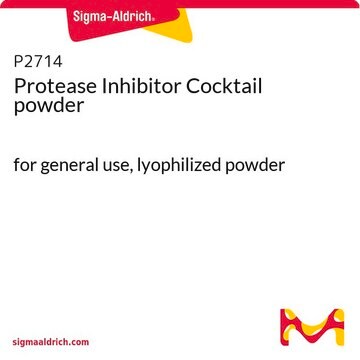PMSF-RO
Roche
PMSF
Phenylmethylsulfonyl fluoride
Synonym(s):
Phenylmethanesulfonyl fluoride, phenylmethylsulfonyl fluoride, α-Toluenesulfonyl fluoride, Benzylsulfonyl fluoride, PMSF, Phenylmethylsulfonyl fluoride
About This Item
Recommended Products
Quality Level
Assay
98% (TLC)
form
solid
mol wt
174.2
packaging
pkg of 10 g (10837091001)
pkg of 25 g (11359061001)
manufacturer/tradename
Roche
concentration
17-170 μg/mL
technique(s)
western blot: suitable
pKa
7.0
mp
92-94 °C
Looking for similar products? Visit Product Comparison Guide
1 of 4
This Item | P7626 | 93482 | 52332 |
|---|---|---|---|
| Quality Level 100 | Quality Level - | Quality Level 200 | Quality Level 200 |
| form solid | form powder | form liquid | form crystalline solid |
| shipped in ambient | shipped in - | shipped in - | shipped in ambient |
| storage temp. 20-25°C | storage temp. - | storage temp. 2-8°C | storage temp. 10-30°C |
| solubility >10 mg/mL | solubility dry solvents (ethanol, methanol, and 2-propanol): 200 mM (Stock solution are stable for months at 4°C.), H2O: unstable | solubility - | solubility ethanol: soluble, isopropanol: soluble, methanol: soluble |
General description
Specificity
Application
PMSF (phenylmethylsulfonyl fluoride) has been used for the preparation of protein extracts from tissues and cells prior to Western blotting.[1][2][3]
Biochem/physiol Actions
Quality
Preparation Note
Working concentration: 17 to 170 μg/ml (0.1 to 1 mM)
Working solution: Due to the short half-life of PMSF, fresh solution must be added at every purification step. Under certain conditions, such as alkaline pH values, PMSF may have a half-life of only 35 minutes. High-salt conditions (3 M), often used to precipitate proteins, may also reverse the inhibition of PMSF. Pefabloc SC is recommended as a non-toxic, water-soluble, and water-stable alternative.
Storage conditions (working solution): 15 to 25 °C
Stock solutions of PMSF in 100% isopropanol are stable for at least 9 months at 15 to 25 °C.
Reconstitution
Other Notes
Certificates of Analysis (COA)
Search for Certificates of Analysis (COA) by entering the products Lot/Batch Number. Lot and Batch Numbers can be found on a product’s label following the words ‘Lot’ or ‘Batch’.
Need A Sample COA?
This is a sample Certificate of Analysis (COA) and may not represent a recently manufactured lot of this specific product.
Already Own This Product?
Find documentation for the products that you have recently purchased in the Document Library.
Customers Also Viewed
Our team of scientists has experience in all areas of research including Life Science, Material Science, Chemical Synthesis, Chromatography, Analytical and many others.
Contact Technical Service












